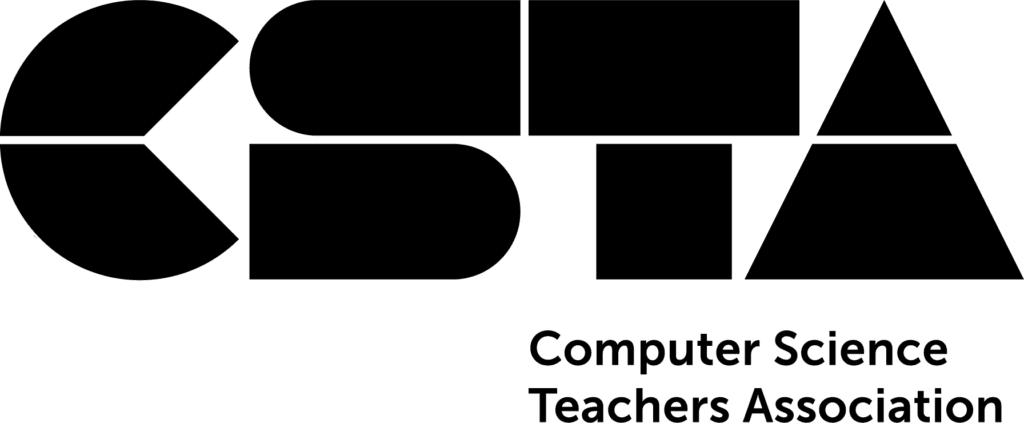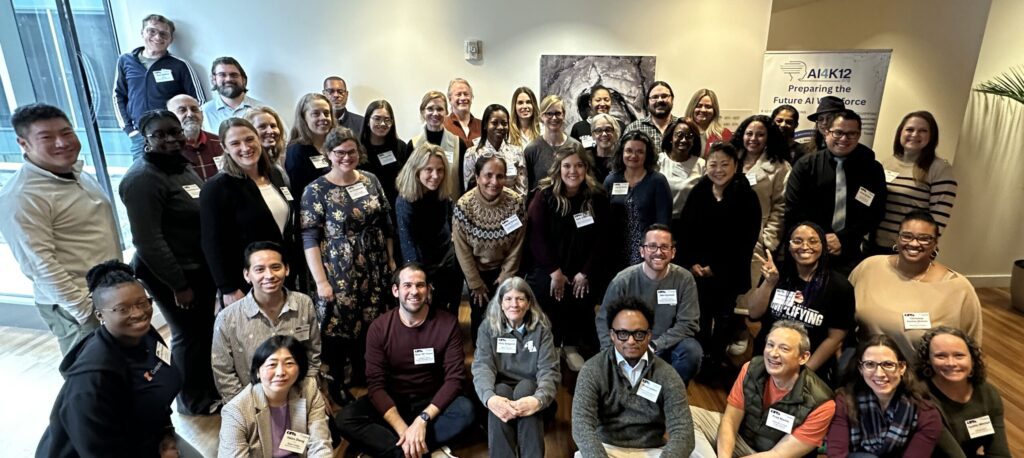AI Learning Priorities
for All K-12 Students
AI Learning Priorities
for All K-12 Students
About
The Computer Science Teachers Association (CSTA), in partnership with AI4K12, spearheaded the Identifying AI Priorities for All K-12 Students project. The project gathered experts – including teachers, researchers, administrators, and curriculum developers – to articulate priorities for AI education. The project had four goals:
- Identify priorities for AI learning across each K-12 grade band. As a result of a collaborative, iterative process, the project articulated five categories for AI learning: Humans and AI, Representation and Reasoning, Machine Learning, Ethical AI System Design and Programming, and Societal Impacts of AI.
- Suggest updates to the AI4K12 Guidelines. Advances in generative AI necessitate updates to the AI4K12 Guidelines. This is especially true for Big Idea #4: Natural Interaction, since generative AI represents a substantial advance in the ability of AI to interact with humans. Similarly, generative AI raises many ethical questions relevant to Big Idea #5: Societal Impacts.
- Advance the research agenda for K-12 AI education. Priorities for research in AI education include the importance of supporting teachers, promoting inclusive and student-centered pedagogies, developing appropriate tools, gaining a better understanding of AI’s impact on learning, and ensuring equity in AI education.
- Share promising practices across the AI and CS education communities. Participants shared their work in AI education. While the practices described varied, there were some common themes. Concerns about ethics and responsible AI were foregrounded, and hands-on learning activities were featured prominently. Meeting the needs of all children was a key concern, with approaches and tools that are widely accessible as well as engaging for all students. As a result of these common themes, we offer related recommendations for AI curriculum and instruction
The results of goal #1 above will heavily inform the AI-related content that appears in the 2026 CSTA K-12 Standards. Additional information related to goals #2-4 can be found in the report.
Project Team
Authors and Leadership
The project is primarily planned, facilitated and coordinated by the Principal Investigators:

Bryan Twarek
Jake Koressel

Dr. Christina Gardner-McCune
Dr. David Touretzky
Project Support
Additional team members played substantive roles in the success of the workshop and producing high-quality outputs.
DATA SYNTHESIS AND REPORT WRITING:
Dr. Julie M. Smith, Senior Education Researcher, Institute for Advancing Computing Education
EVENT PLANNING AND COORDINATION:
Oliver Moss, Administrative Assistant, Carnegie Mellon University
Participants
- Leah Aiwohi, Teacher, Kauai High School, Lihue, HI
- Quiana Bannerman, Director, Maryland Center for Computing Education, Adelphi, MD
- Dr. Tiffany Barnes, Distinguished Professor, North Carolina State University, Raleigh, NC
- Kris Beck, Director of Computer Science, Chicago Public Schools, Chicago, IL
- Dr. Nancye Blair Black, CEO, The Block Uncarved, Lakeland, FL
- Angela Chavez, Teacher, Computer Science Virtual Academy, LAUSD, Los Angeles, CA
- Beverly Clarke MBE, Education Consultant, United Kingdom
- Sofía De Jesús, Associate Program Manager, CMU CS Academy, Pittsburgh, PA
- Dr. Leigh Ann DeLyser, Director, SRI, New York, NY
- Dr. Kayla DesPortes, Assistant Professor, NYU, New York, NY
- Charlotte Dungan, Chief Learning Officer, Mark Cuban Foundation, Durham, NC
- Veronica Ellis, Content Development and Research Manager, Code.org/TeachAI, Boston, MA
- Mark Emry, Austin Program Manager, Institute for Computing in Research, Austin, TX
- Rudy Escobar, STEM and Computer Science Coordinator, Stanislaus County Office of Education, Modesto, CA
- Charity Freeman, CS Curriculum and PD Specialist, Illinois Math and Science Academy, Aurora, IL
- Laura Gray, AI and CS Instructional Coach, Gwinnett County Public Schools, Athens, GA
- Dr. Shuchi Grover, Director of AI and Education Research, Looking Glass Ventures, Austin, TX
- Mary Cate Gustafson-Quiett, RAISE Lead for K-12 Curriculum Development, MIT, Cambridge, MA
- Mahmoud Harding, Instructional Design Director, Data Science 4 Everyone, Cary, NC
- Katie Henry, Head of North America, Micro:bit Educational Foundation, Pittsburgh, PA
- Sallie Holloway, Director of AI and CS, Gwinnett County Public Schools, Suwanee, GA
- Dr. Maya Israel, Associate Professor, University of Florida, Gainesville, FL

- Dr. Sean Jackson, K-12 CS Lead, Kentucky Department of Education, Tollesboro, KY
- Amber Jones, Computer Science Curriculum and PD Consultant, Amber Sparks Education, Lithonia, GA
- Sarah Eli Judd, Design and Technology Instructor, Franklin School, Jersey City, NJ
- Dr. Sonia Koshy, Chief Research Officer, Kapor Foundation, Oakland, CA
- Dr. Victor Lee, Associate Professor, Stanford University, Stanford, CA
- David Lockett, K-16 Outreach, Meharry School of Applied Computational Sciences, Nashville, TN
- Kate Lockwood, Director of CS and Engineering, St. Paul Academy, St. Paul, MN
- Dr. Fred Martin, Professor and Chair, University of Texas at San Antonio, San Antonio, TX
- Dr. Cynthia Mitchell, Director, AP Computer Science Principles, College Board, Satellite Beach, FL
- Christian Pinedo, Chief of Staff, aiEDU, San Francisco, CA
- Kelly Powers, CS Teacher, Hackley School, Tarrytown, NY
- Dan Schneider, Principal Content Developer, Code.org, Tucson, AZ
- Vicky Sedgwick, President, CSTA Greater Los Angeles, Canoga Park, CA
- Keisha Tennessee, Computer Science Coordinator, Virginia Department of Education, Richmond, VA
- Dr. Emily Thomforde, Computer Sciences Department Chair, Reach University, Asheville, NC
- Matthew Winters, AI Education Specialist, Utah State Board of Education, Salt Lake City, UT
- Dr. Helen Zhang, Research Associate Professor, Boston College, Chestnut Hill, MA
Acknowledgements
Thank you to the Carnegie Mellon School of Computer Science for hosting the workshop.
We also thank the following reviewers and CSTA K-12 Standards Advisory Board members for providing invaluable feedback:
Jared Amalong, Katie Bosch-Wilson, Josh Caldwell, Dr. Alexis Cobo, Dr. Jamila Cocchiola, Michael Corcoran, Christy Crawford, Dr. Melissa DeLaurentis, Amanda Dykes, Dr. Amy Eguchi, Sara Frey, Dr. Michelle Friend, Katherine Goyette, Laura Gray, Dr. Yasemin Gulbahar, Eli Hamrick, Alecia Henderson, Elissa Hozore, Dr. Christine Liebe, Jeremy Maker, Bill Marsland, Dr. Jaci McCune, Dr. Kelly Mills, Dr. Cynthia Mitchell, Paula Moore, Adam Musto, Brandon Nicholson, Katie O’Shea, Jen Rosato, Dr. Carolyn Rose, Dr. Pati Ruiz, Dr. Laurie Salvail, Spruha Satavlekar, Sherri Smith, Brett Tanaka, Dr. Ryan Torbey, Dr. Jane Waite, Shana V. White, John Wiseman, Kristina Yamada, Shaun Young, and Wonjin Yu.
Funding Support

This project is supported by the National Science Foundation (NSF) under Grant No. 2444214. Any opinions, findings, and conclusions or recommendations expressed in this material are those of the author(s) and do not necessarily reflect the views of the NSF.
